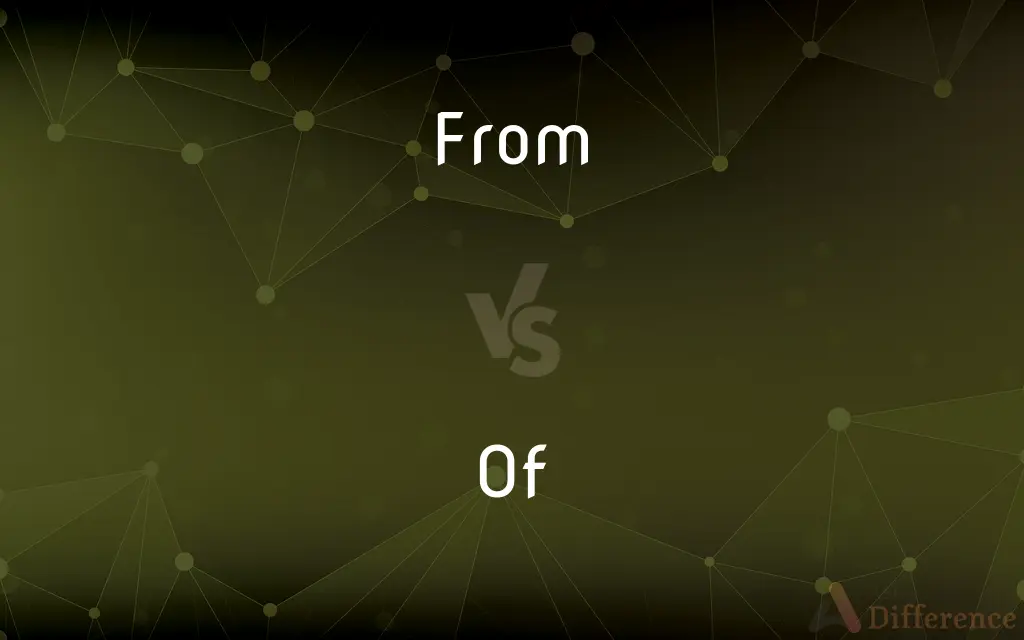From vs. Of — What's the Difference?

Difference Between From and Of
ADVERTISEMENT
Compare with Definitions
From
Used to indicate a specified place or time as a starting point
Walked home from the station.
From six o'clock on. See Usage Notes at escape, whence.
Of
Expressing the relationship between a part and a whole.
From
Used to indicate a specified point as the first of two limits
From grades four to six.
Of
Expressing the relationship between a scale or measure and a value
An increase of 5%
A height of 10 metres
From
Used to indicate a source, cause, agent, or instrument
A note from the teacher.
Taking a book from the shelf.
ADVERTISEMENT
Of
Indicating an association between two entities, typically one of belonging, in which the first is the head of the phrase and the second is something associated with it
A photograph of the bride
The son of a friend
The government of India
A former colleague of John's
From
Used to indicate constituent material or materials
A table made from wood.
Of
Expressing the relationship between a direction and a point of reference
North of Watford
From
Used to indicate separation, removal, or exclusion
Keep someone from making a mistake.
Liberation from bondage.
Of
Expressing the relationship between a general category or type and the thing being specified which belongs to such a category
The idea of a just society
The population of interbreeding individuals
This type of book
The city of Prague
From
Used to indicate differentiation
Know right from wrong.
Of
Following a noun derived from or related to a verb.
From
Because of
Faint from hunger.
Of
Where the head of the phrase is a predicative adjective
I am certain of that
It was kind of you to ask
From
Used to indicate source or provenance.
Paul is from New Zealand.
I got a letter from my brother.
You can't get all your news from the Internet.
Of
Indicating the relationship between a verb and an indirect object.
From
Originating at (a year, time, etc.)
This manuscript is from the 1980s.
Of
Indicating the material or substance constituting something
Walls of stone
The house was built of bricks
From
Used to indicate a starting point or initial reference.
He had books piled from floor to ceiling.
He departed yesterday from Chicago.
This figure has been changed from a one to a seven.
Face away from the wall!
Of
Expressing time in relation to the following hour
It would be just a quarter of three in New York
From
Indicating a starting point in time.
The working day runs from 9 am to 5 pm.
Tickets are available from 17th July.
Of
Derived or coming from; originating at or from
Customs of the South.
From
Indicating a starting point on a range or scale.
Rate your pain from 1 to 10.
Start counting from 1.
Of
Caused by; resulting from
A death of tuberculosis.
From
Indicating a starting point on an array or gamut of conceptual variations.
You can study anything from math to literature.
Of
Away from; at a distance from
A mile east of here.
From
With reference to the location or position of a speaker or other observer or vantage point.
It's hard to tell from here.
Try to see it from his point of view.
The bomb went off just 100 yards from where they were standing.
From the top of the lighthouse you can just see the mainland.
Of
So as to be separated or relieved from
Robbed of one's dignity.
Cured of distemper.
From
(MLE) Indicates a starting state of the predicament of the subject. since being
I’ve been doing this from pickney.
Of
From the total or group comprising
Give of one's time.
Two of my friends.
Most of the cases.
From
Indicating removal or separation.
After twenty minutes, remove the cake from the oven.
The general was ousted from power.
Of
Composed or made from
A dress of silk.
From
Denoting a subtraction operation.
20 from 31 leaves 11.
Of
Associated with or adhering to
People of your religion.
From
Indicating exclusion.
She was barred from entering.
A parasol protects from the sun.
Of
Belonging or connected to
The rungs of a ladder.
From
Indicating differentiation.
Your opinions differ from mine.
He knows right from wrong.
Of
Possessing; having
A person of honor.
From
Produced with or out of (a substance or material).
It's made from pure gold.
Of
On one's part
Very nice of you.
From
Used to indicate causation; because of, as a result of.
Too many people die from breast cancer.
Of
Containing or carrying
A basket of groceries.
From
Out of the neighborhood of; lessening or losing proximity to; leaving behind; by reason of; out of; by aid of; - used whenever departure, setting out, commencement of action, being, state, occurrence, etc., or procedure, emanation, absence, separation, etc., are to be expressed. It is construed with, and indicates, the point of space or time at which the action, state, etc., are regarded as setting out or beginning; also, less frequently, the source, the cause, the occasion, out of which anything proceeds; - the antithesis and correlative of to; as, it, is one hundred miles from Boston to Springfield; he took his sword from his side; light proceeds from the sun; separate the coarse wool from the fine; men have all sprung from Adam, and often go from good to bad, and from bad to worse; the merit of an action depends on the principle from which it proceeds; men judge of facts from personal knowledge, or from testimony.
Experience from the time past to the time present.
The song began from Jove.
From high Mæonia's rocky shores I came.
If the wind blow any way from shore.
Sudden partings such as pressThe life from out young hearts.
Of
Specified as; named or called
A depth of ten feet.
The Garden of Eden.
Of
Centering on; directed toward
A love of horses.
Of
Produced by; issuing from
Products of the vine.
Of
Characterized or identified by
A year of famine.
Of
With reference to; about
Think highly of her proposals.
Will speak of it later.
Of
In respect to
Slow of speech.
Of
Set aside for; taken up by
A day of rest.
Of
Before; until
Five minutes of two.
Of
During or on a specified time
Of recent years.
Of
By
Beloved of the family.
Of
Used to indicate an appositive
That idiot of a driver.
Of
(Archaic)On
"A plague of all cowards, I say" (Shakespeare).
Of
Expressing distance or motion.
Of
From (of distance, direction), "off".
Of
Since, from (a given time, earlier state etc.).
Of
From, away from (a position, number, distance etc.).
There are no shops within twenty miles of the cottage.
Of
Expressing separation.
Of
Indicating removal, absence or separation, with the action indicated by a transitive verb and the quality or substance by a grammatical object.
Finally she was relieved of the burden of caring for her sick husband.
Of
Indicating removal, absence or separation, with resulting state indicated by an adjective.
He seemed devoid of human feelings.
Of
(obsolete) Indicating removal, absence or separation, construed with an intransitive verb.
Of
Expressing origin.
Of
Indicating an ancestral source or origin of descent.
The word is believed to be of Japanese origin.
Of
Introducing an epithet that indicates a birthplace, residence, dominion, or other place associated with the individual.
Jesus of Nazareth (after hometown)
Anselm of Canterbury (after diocese)
Anselm of Aosta (after birthplace)
Anselm of Bec (after monastery)
Pedro II of Brazil (after dominion)
Mrs Miggins of Gasworks Road, Mudchester (after place of residence)
Of
Indicating a (non-physical) source of action or emotion; introducing a cause, instigation; from, out of, as an expression of.
The invention was born of necessity.
Of
(following an intransitive verb) Indicates the source or cause of the verb.
It is said that she died of a broken heart.
Of
(following an adjective) Indicates the subject or cause of the adjective.
I am tired of all this nonsense.
Of
Expressing agency.
Of
(following a passive verb) Indicates the agent (for most verbs, now usually expressed with by).
I am not particularly enamoured of this idea.
Of
Used to introduce the "subjective genitive"; following a noun to form the head of a postmodifying noun phrase (see also 'Possession' senses below).
The contract can be terminated at any time with the agreement of both parties.
Of
(following an adjective) Used to indicate the agent of something described by the adjective.
It was very brave of you to speak out like that.
Of
Expressing composition, substance.
Of
(after a verb expressing construction, making etc.) Used to indicate the material or substance used.
Many 'corks' are now actually made of plastic.
Of
(directly following a noun) Used to indicate the material of the just-mentioned object.
She wore a dress of silk.
Of
Indicating the composition of a given collective or quantitative noun.
What a lot of nonsense!
Of
Used to link a given class of things with a specific example of that class.
Welcome to the historic town of Harwich.
Of
Links two nouns in near-apposition, with the first qualifying the second; "which is also".
I'm not driving this wreck of a car.
Of
Introducing subject matter.
Of
Links an intransitive verb, or a transitive verb and its subject (especially verbs to do with thinking, feeling, expressing etc.), with its subject-matter; concerning, with regard to.
I'm always thinking of you.
Of
(following a noun (now chiefly nouns of knowledge, communication etc.)) Introduces its subject matter; about, concerning.
He told us the story of his journey to India.
Of
(following an adjective) Introduces its subject matter.
This behaviour is typical of teenagers.
Of
Having partitive effect.
Of
(following a number or other quantitive word) Introduces the whole for which is indicated only the specified part or segment; "from among".
Most of these apples are rotten.
Of
(following a noun) Indicates a given part.
Of
Some, an amount of, one of.
On the whole, they seem to be of the decent sort.
Of
Links to a genitive noun or possessive pronoun, with partitive effect (though now often merged with possessive senses, below).
He is a friend of mine.
Of
Expressing possession.
Of
Belonging to, existing in, or taking place in a given location, place or time. Compare "origin" senses, above.
He was perhaps the most famous scientist of the twentieth century.
Of
Belonging to (a place) through having title, ownership or control over it.
The owner of the nightclub was arrested.
Of
Belonging to (someone or something) as something they possess or have as a characteristic; the "possessive genitive". (With abstract nouns, this intersects with the subjective genitive, above under "agency" senses.)
Keep the handle of the saucepan away from the flames.
Of
Forming the "objective genitive".
Of
Follows an agent noun, verbal noun or noun of action.
She had a profound distrust of the police.
Of
Expressing qualities or characteristics.
Of
Links an adjective with a noun or noun phrase to form a quasi-adverbial qualifier; in respect to, as regards.
My companion seemed affable and easy of manner.
Of
Indicates a quality or characteristic; "characterized by".
Pooh was said to be a bear of very little brain.
Of
Indicates quantity, age, price, etc.
We have been paying interest at a rate of 10%.
Of
Used to link singular indefinite nouns (preceded by the indefinite article) and attributive adjectives modified by certain common adverbs of degree.
It's not that big of a deal.
Of
Expressing a point in time.
Of
During the course of (a set period of time, day of the week etc.), now specifically with implied repetition or regularity.
Of an evening, we would often go for a stroll along the river.
Of
For (a given length of time).
I’ve not tekken her out of a goodly long while.
Of
(after a noun) Indicates duration of a state, activity etc.
After a delay of three hours, the plane finally took off.
Of
Denotes the number of minutes before the hour;Before (the hour); to.
What's the time? / Nearly a quarter of three.
Of
(usually in modal perfect constructions) have, chiefly in depictions of colloquial speech.
Of
In a general sense, from, or out from; proceeding from; belonging to; relating to; concerning; - used in a variety of applications; as:
Of
Denoting that from which anything proceeds; indicating origin, source, descent, and the like; as, he is of a race of kings; he is of noble blood.
That holy thing which shall be born of thee shall be called the Son of God.
I have received of the Lord that which also I delivered unto you.
Of
Denoting possession or ownership, or the relation of subject to attribute; as, the apartment of the consul: the power of the king; a man of courage; the gate of heaven.
Of
Denoting the material of which anything is composed, or that which it contains; as, a throne of gold; a sword of steel; a wreath of mist; a cup of water.
Of
Denoting part of an aggregate or whole; belonging to a number or quantity mentioned; out of; from amongst; as, of this little he had some to spare; some of the mines were unproductive; most of the company.
It is of the Lord's mercies that we are not consumed.
It is a duty to communicate of those blessings we have received.
Of
Denoting that by which a person or thing is actuated or impelled; also, the source of a purpose or action; due to; as, they went of their own will; no body can move of itself; he did it of necessity.
For it was of the Lord to harden their hearts.
Of
Denoting reference to a thing; about; concerning; relating to; as, to boast of one's achievements; they talked of many things.
Knew you of this fair work?
Of
Denoting nearness or distance, either in space or time; from; as, within a league of the town; within an hour of the appointed time.
Of
Denoting identity or equivalence; - used with a name or appellation, and equivalent to the relation of apposition; as, the continent of America; the city of Rome; the Island of Cuba.
Of
Denoting the agent, or person by whom, or thing by which, anything is, or is done; by.
And told to her of [by] some.
He taught in their synagogues, being glorified of all.
[Jesus] being forty days tempted of the devil.
Of
Denoting relation to place or time; belonging to, or connected with; as, men of Athens; the people of the Middle Ages; in the days of Herod.
Of
Denoting passage from one state to another; from.
Of
During; in the course of.
Not be seen to wink of all the day.
My custom always of the afternoon.
Why, knows not Montague, that of itselfEngland is safe, if true within itself?
Share Your Discovery

Previous Comparison
Tall vs. Big
Next Comparison
Salary vs. Income













































